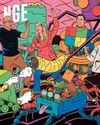
THE GERMAN HISTORIAN Oswald Spengler considered our age the age of abstraction. Nowhere is this more apparent than in programming, where abstraction isn't just a conceptual convenience but an absolute necessity. Programmers like to talk about their tools (rather abstractly) as a "stack." At the top of the stack - the surface most of us encounter first - are simple markup languages, HTML being the best known. At the bottom are the "bare metal" languages of the machine. Thus there is a hierarchy, and the further down in the stack you go, the less abstract—and, in a way, more difficult - programming gets.
It's not really metal down there, of course. It's sand - impossibly thin layers of silicon dioxide that conduct electrical impulses in ordered patterns we experience as a screen showing us a rectangle with text on it, flickering images, and so on. Still, you can see how Spengler, though he died before the era of digital computing, was onto something. None of us are keeping 1s and Os etched in sand in our head, and yet we all manipulate them every day using friendly, high-level abstractions.
The danger of living in this Spenglerian moment is that it's easy to mistake such abstractions for the world as it really is. This, I think, is why programmers often dive deeper into the stack as they progress through their careers. We think that maybe when we reach bare metal our world will finally be real.
I started, like most, at the top of the stack. HTML. 1995. Geocities. Angelfire. Blink tags. Marquee. I'll admit it: I loved me some marquee tag, which scrolled text across the screen. I loved marquee so much I ran straight out of HTML and into the welcoming arms of Flash. Blame the Matrix website. Coolest animation ever.
This story is from the May - June 2024 edition of WIRED.
Start your 7-day Magzter GOLD free trial to access thousands of curated premium stories, and 9,000+ magazines and newspapers.
Already a subscriber ? Sign In
This story is from the May - June 2024 edition of WIRED.
Start your 7-day Magzter GOLD free trial to access thousands of curated premium stories, and 9,000+ magazines and newspapers.
Already a subscriber? Sign In

MOVE SLOWLY AND BUILD THINGS
EVERYTHING DEPENDS ON MICROCHIPS-WHICH MEANS TOO MUCH DEPENDS ON TAIWAN. TO REBUILD CHIP MANUFACTURING AT HOME, THE U.S. IS BETTING BIG ON AN AGING TECH GIANT. BUT AS MONEY AND COLOSSAL INFRASTRUCTURE FLOW INTO OHIO, DOES TOO MUCH DEPEND ON INTEL?

FOLLOW THAT CAR
CHASING A ROBOTAXI FOR HOURS AND HOURS IS WEIRD AND REVELATORY, AND BORING, AND JEALOUSY-INDUCING. BUT THE DRIVERLESS WORLD IS COMING FOR ALL OF US. SO GET IN AND BUCKLE UP.

REVENGE OF THE SOFTIES
FOR YEARS, PEOPLE COUNTED MICROSOFT OUT. THEN SATYA NADELLA TOOK CONTROL. AS THE COMPANY TURNS 50, IT'S MORE RELEVANT-AND SCARIER-THAN EVER.

THE NEW COLD WARRIOR
CHINA IS RACING TO UNSEAT THE UNITED STATES AS THE WORLD'S TECHNOLOGICAL SUPERPOWER

CALIFORNIA DREAMIN'
KINDRED MOTORWORKS VW BUS - Despite being German, the VW T1 Microbus is as Californian as the Grateful Dead.

THE INSIDE SCOOP ON DESSERT TECH
A lab in Denmark works to make the perfect ice cream. Bring on the fava beans?

CONFESSIONS OF A HINGE POWER DATER
BY HIS OWN estimation, JB averages about three dates a week. \"It's gonna sound wild,\" he confesses, \"but I've probably been on close to 200 dates in the last year and a half.\"

THE WATCHFUL INTELLIGENCE OF TIM COOK
APPLE INTELLIGENCE IS NOT A PLAY ON \"AI,\" THE CEO INSISTS. BUT IT IS HIS PLAY FOR RELEVANCE IN ALL AREAS, FROM EMAIL AUTO-COMPLETES TO APPS THAT SAVE LIVES.

COPYCATS (AND DOGS)
Nine years ago, a pair of freshly weaned British longhair kittens boarded a private plane in Virginia and flew to their new home in Europe.

STAR POWER
The spirit of Silicon Valley lives onat this nuclear fusion facility's insane, top-secret opening ceremony.